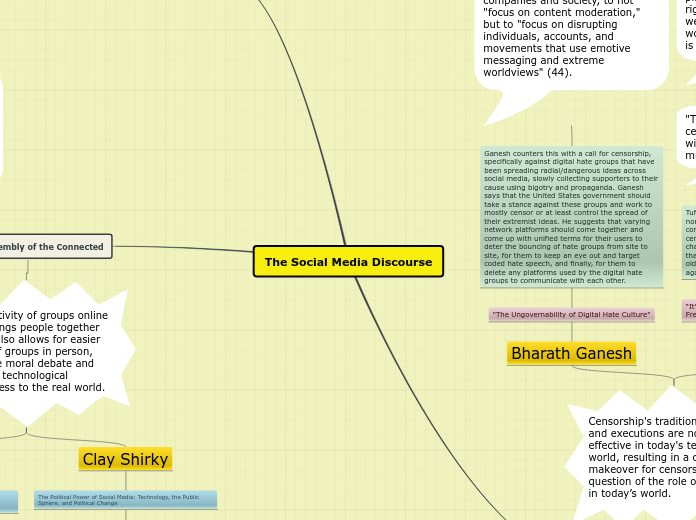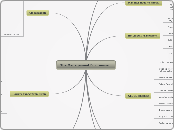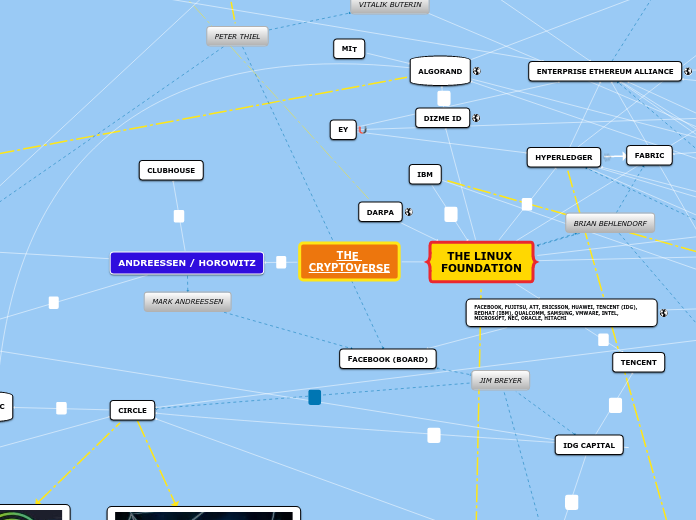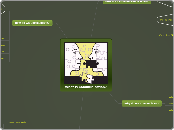The Social Media Discourse
Assembly of the Connected
The connectivity of groups online not only brings people together online but also allows for easier assembly of groups in person, bringing the moral debate and concerns of technological connectedness to the real world.
Clay Shirky
The Political Power of Social Media: Technology, the Public Sphere, and Political Change
Shirky points out other movements that have used social media as a way to connect in real life to act, saying that social media doesn't replace real world action but instead helps unite supporters of the cause to act.
"Recent protest movements - including a movement against fundamentalist vigilantes in India in 2009, the beef protests in South Korea in 2008, and protests against education laws in Chile in 2006 - have used social media not as a replacement for real-world action but as a way to coordinate it" (38).
Loader et al.
The Networked Young Citizen: Social Media, Political Participation, and Civic Engagement
Loader et al. focuses their attention on the benefits of online to the physical assembly of people for their cause. They focus on the idea of the "networked young citizen" who uses social media to easily connect and rally people to fight the power for their right to be heard. Loader et al. comments on the "defining characteristic" of young people using social media networks to spread the news of corruption and rally people to fight against it.
The Networked Young Citizen "mobilized through mass demonstrations... outraged against political corruption..." (148).
The Dichotomy of Connectivity
Connectivity is a powerful tool that can connect people into groups anytime, anywhere in ways that can be beneficial, insignificant, or even detrimental to society.
Ganesh takes this idea and Tufekci's point even further, pointing out the growing pandemic of digital hate groups who are taking advantage of social media's connectivity to spread their radical propaganda and dangerous messages of violence across the internet and collecting people for their cause. The power of social media is being used to everyone's benefit - regardless of whether they aim for altruistic, insignificant, or detrimental goals.
"While social media has been used by activists trying to counter authoritarian regimes and organize peaceful protests, [social media platforms'] low barriers to entry have allowed extreme groups to exploit its benefits" (30).
Zenup Tufekci
Tufekci agrees with Chayko - social media has given people the power of mass discourse without the constraints of time and space. However, Tufekci points out what Chayko has looked over: the connectivity and more ease of assembly for dangerous groups. She points out the radical Buddhist monks of Myanmar who are using this technology to fuel the blood lust of their ethnic cleansing goals.
"Facebook doesn't just connect democracy-loving Egyptian dissidents and fans of the videogame Civilization it brings together white supremacists, who can now assemble far more effectively" (7).
Mary Chayko
Superconnected: The Internet, Digital Media, and Techno-Social Life
Chayko describes social media and SMS as a revolution of communication and connectivity - it is able to connect people from all over the world anytime. Chayko sees this in a positive light - people are social creatures who need to communicate. And with communication comes the spread of new ideas and information worldwide using this technology. People are now able to form communities with others of similar beliefs and interests that they wouldn't have possibly been able to meet without the superconnectiveness of social media. The communities formed could range greatly in interests/beliefs.
"The internet and digital media connect people together in ways both mundane and significant" (6).
The Censorship Makeover
Censorship's traditional methods and executions are no longer effective in today's technological world, resulting in a complete makeover for censorship and the question of the role of censorship in today’s world.
Zeynep Tufekci
“It's the (Democracy-Poisoning) Golden Age of Free Speech”
Tufekci points out that due to the fast-spreading, nonhierarchical format of technology and, consequently, information - it is impossible to censor using previous methods. She calls for a change of fighting threats to censorship, insisting that our previous protections were made for older weapons that are simply no longer useful against censorship’s new tactics.
"The most effective forms of censorship today involve meddling with trust and attention, not muzzling speech itself.”
"Variations on this general playbook for censorship - find the right choke point then squeeze - were once the norm all around the world ... But today that playbook is all but obsolete”
Bharath Ganesh
"The Ungovernability of Digital Hate Culture"
Ganesh counters this with a call for censorship, specifically against digital hate groups that have been spreading radial/dangerous ideas across social media, slowly collecting supporters to their cause using bigotry and propaganda. Ganesh says that the United States government should take a stance against these groups and work to mostly censor or at least control the spread of their extremist ideas. He suggests that varying network platforms should come together and come up with unified terms for their users to deter the bouncing of hate groups from site to site, for them to keep an eye out and target coded hate speech, and finally, for them to delete any platforms used by the digital hate groups to communicate with each other.
Ganesh proposes for governments, in alliance with tech companies and society, to not "focus on content moderation," but to "focus on disrupting individuals, accounts, and movements that use emotive messaging and extreme worldviews" (44).









